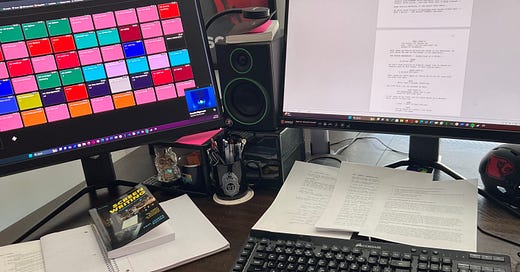Earlier this week, I FADED OUT the first draft of the latest feature film spec I’ve been working on, with the awkward holding title of Split/Code. I very specifically wanted to write a high-concept, tech or Sci-Fi oriented story, with maybe a touch of horror or body horror; a far cry from the novel I’m currently working on, and quite a bit different from the other projects I’m developing.
Here’s the log line—
When a dying tech billionaire resorts to black market biohacking to cheat death, he unleashes a monstrous new personality determined to seize full control of their shared body…
Clearly, I wore my influences on my sleeve with this one—a modern spin on the Strange Case of Dr. Jekyll and Mr. Hyde—although I think this draft actually strays a little farther afield than that.
Nevertheless, I’m happy with the bones of what I’ve got.
It landed at 106 pages, and I didn’t feel like I was curbing too much to bring it in at the count (I wanted 98-107). There are three “main characters,” and a quick run of Final Draft’s script reports reveals they command 18%, 20%, and 24% of the scenes(?) respectively, which feels roughly about right, although I'm far from a Final Draft power user, and don’t have a lot of experience with either its script reports or the value of them. But even a cursory count of pages/scenes confirms I’ve got my three acts roughly where your cat would expect them, the beats are about where they need to be, and most of the scenes have appropriate GSU (Goals, Stakes, Urgency) to propel the story forward.
None of this means it’s a good script; just that at this stage, it’s a technically serviceable script, and hopefully not a fatally bad one. Although at this point I’d generally just dive right back into it the next day or so and start revising, I think instead I’ll let this sit for a couple of weeks, then go back with fresh eyes. I wrote this as a true spec, with no plan other than to get another feature screenplay sample under my belt (I have several TV and pilot script samples), so I have the luxury of time to mess around with it, to really develop it to its fullest potential…
As a matter of fact, when folks out in the world ask what I’m doing now, post-DEA, I most often just tell them I’m in development…
Like this spec screenplay, writers spend a lot of time working on things with uncertain futures.
I recently read an article where a screenwriter/producer lamented how in the last five years, they’ve staffed five rooms, developed three pilots (including an original all their own), but only one of those things actually went into production (one even had significant talent attached, before it was cut loose by the network). They also developed several “cost conscious” indie films (probably in line with the kind of budget I could envision for something like Split/Code), with no success to show for their efforts there, either.
This kind of “perpetual development” is hard, frustrating, and time consuming, but it is the heart of the business…although most studios don’t even do their own internal development anymore, preferring to outsource or buy “ready made” packages already put together by outside producers or production studios.
According to some numbers I recently saw, over the last four years—
About 90% of the films studios made came from outside their own internal original development system;
Only 10% of the films did not have talent (i.e., a director or actor) attached when the studios got involved, and;
Only 1/3 of the studio releases were part of pre-existing IP.
To dig into this last number a bit, about a third of the films were original ideas that at some point in the development process were either bought off a log line/pitch…or a full spec, just like the one I’m working on.
All these things start somewhere…so they might as well start with your idea, your pitch, your script. That’s why I’ve started to view every novel or script as a perpetual “development project,” a little mental hack to remind myself (and gird myself for) the reality that writing the thing itself is only one step on whatever journey it ultimately takes. And while long development on most things still will most often lead nowhere—another trunked novel, another un-produced script—we have to make sure we don’t let that frustration affect the work itself.
Before signing off this week, I want to note two great sources about the entertainment industry, including Puck, and The Ankler. While both require some level of subscription, I find they’re invaluable for insight, news, and commentary.
You should absolutely check them out.
As always, feel free to—






Good stuff. I think of every book I'm working on as a movie or mini series, although I have no clue how to transform a novel into a screen play. I think about this a lot.